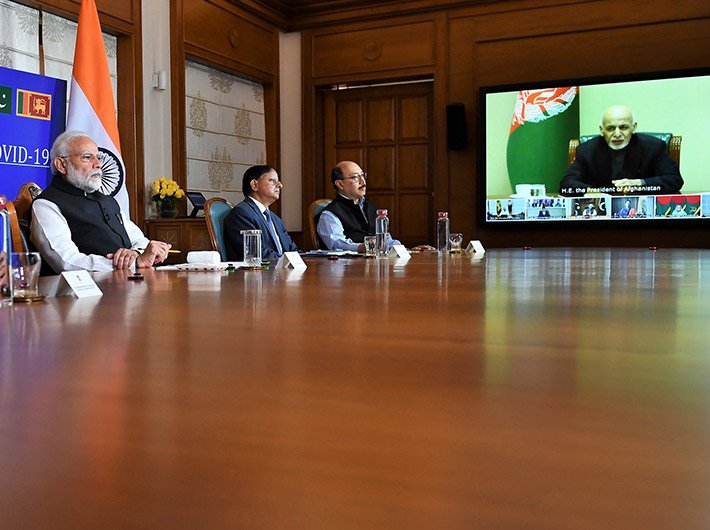PM Modi interacts with other SAARC leaders, proposes COVID-19 Emergency Fund for member nations
India has taken the lead in reaching out to the neighbouring member-nations of the South Asian Association for Regional Cooperation (SAARC), and prime minister Narendra Modi has proposed to set up a COVID-19 Emergency Fund, with India making an initial offer of $10 million.
Modi on Sunday interacted with the other leaders of the SAARC countries through video conference to chart out a common strategy in order to combat COVID-19 in the region, an official release said. He thanked the other leaders for joining the conference at such short notice. Stressing on the ancient people-to-people ties and interconnectedness of societies of the SAARC countries, he said it is imperative for the nations to prepare to face the challenge together.
“Our SAARC region is home to nearly one-fifth of all humanity. It is densely populated. As developing countries, all of us have significant challenges in terms of access to healthcare facilities. Our people-to-people ties are ancient, and our societies are deeply inter-connected. Therefore, we must all prepare together, we must all act together, and we must all succeed together,” Modi said.
In the spirit of collaboration, the PM proposed the creation of a COVID-19 Emergency Fund based on voluntary contributions from all the countries, with India making an initial offer of $10 million for it. The fund can be used by any of the partner countries to meet the cost of immediate actions. He informed the rest that India is assembling a Rapid Response Team of doctors and specialists, along with testing kits and other equipment, which will be on stand-by, to be placed at the disposal of the countries, if required.
The PM also offered arranging for online training capsules for the emergency response teams of the neighbouring countries and sharing of software behind India’s Integrated Disease Surveillance Portal to help trace possible virus carriers and the people they contacted. He suggested that existing mechanisms like SAARC Disaster Management Centre can be used to pool in best practices.
He also suggested creation of a common Research Platform to coordinate research on controlling epidemic diseases within the South Asian region. He suggested further brainstorming by experts on the long-term economic consequences of COVID-19, and how best to insulate internal trade and local value chains from its impact.
The other leaders thanked the PM for the proposed initiatives. Modi reiterated the resolve to battle together and said that neighbourhood collaboration by SAARC countries should serve as a model for the world.
Modi said the guiding mantra for India has been “prepare, but don’t panic”. He laid down the proactive steps taken, including a graded response mechanism, screening those entering the country, public awareness campaigns on TV, print and social media, special efforts to reach out to the vulnerable groups, ramping up of diagnostic facilities and developing protocols for each stage of managing the pandemic.
He said that India has not only successfully evacuated almost 1,400 Indians from different countries but also evacuated some of the citizens of the neighbouring countries in accordance with the ‘neighbourhood first policy’.
Afghan president Ashraf Ghani said that the greatest vulnerability of Afghanistan is an open border with Iran. He proposed modelling diffusion patterns, creation of common framework for telemedicine and greater cooperation amongst the neighbouring countries.
Sri Lankan president Gotabaya Rajapaksa recommended that SAARC leaders work together to help economy tide over the difficult period. He also recommended establishment of a SAARC Ministerial level group to share best practices and coordinate regional matters on combating COVID-19.
Prime minister Sheikh Hasina thanked Modi for bringing 23 Bangladeshi students back from Wuhan along with Indian students during the quarantine period. She proposed continuance of the dialogue at technical level through video conference between the health ministers and the secretaries of the region.
At the conclusion, Modi said: “We have to fight this battle together, and we have to win it together. Our neighbourhood collaboration should be a model for the world.”


